Local Memo: Google Business Re-verifications, March Update, and Meta Chatbots
Why Financial Services Firms Need a Local SEO Strategy + Genius Search

In the digital age, local search or search engine optimization (SEO) has become crucial for every business wanting to maximize its online presence — financial services companies included. For financial firms, it’s not just about being on the internet but visible to the right audience at the right time.
In this article, we’ll delve into:
- Why financial firms need a robust local SEO strategy
- Six local search tactics to help ensure top SERP rankings and organic traffic
- How to achieve these local search rankings with SOCi Genius
The Importance of Local SEO
Search rankings highly impact online and in-person foot traffic. Our research found that Google Business Profiles (GBPs) in the 3-Pack receive 126% more traffic and 93% more actions (calls, website clicks, and driving directions) than businesses ranked 4-10.
So, how do you increase your local search rankings?
Google determines local search results based on distance, relevance, and prominence.
Local firms can’t change their proximity to a searcher. However, they can influence relevance — the degree to which a Google Business Profile (GBP) aligns with a user’s search query. Firms can also influence prominence or how well-known a business is.
By optimizing for relevance and prominence, financial institutions can improve their chances of appearing in local search results for relevant keywords. .
Six Must-Do Local SEO Tactics
Now that you understand why boosting online visibility is important, let’s dive into what it takes to do so. Below, we’ll unveil six crucial local search tactics that financial firms must implement to gain and maintain an advantage over competitors on search engines.
These efforts will elevate your local SEO strategy and attract relevant traffic and leads to your business!
1. Claim and Optimize All Local Listings
One of the first steps in enhancing your local SEO is to claim and update your local listings. Local listings are online profiles of your business that appear on local directories, search engines, and social media networks.
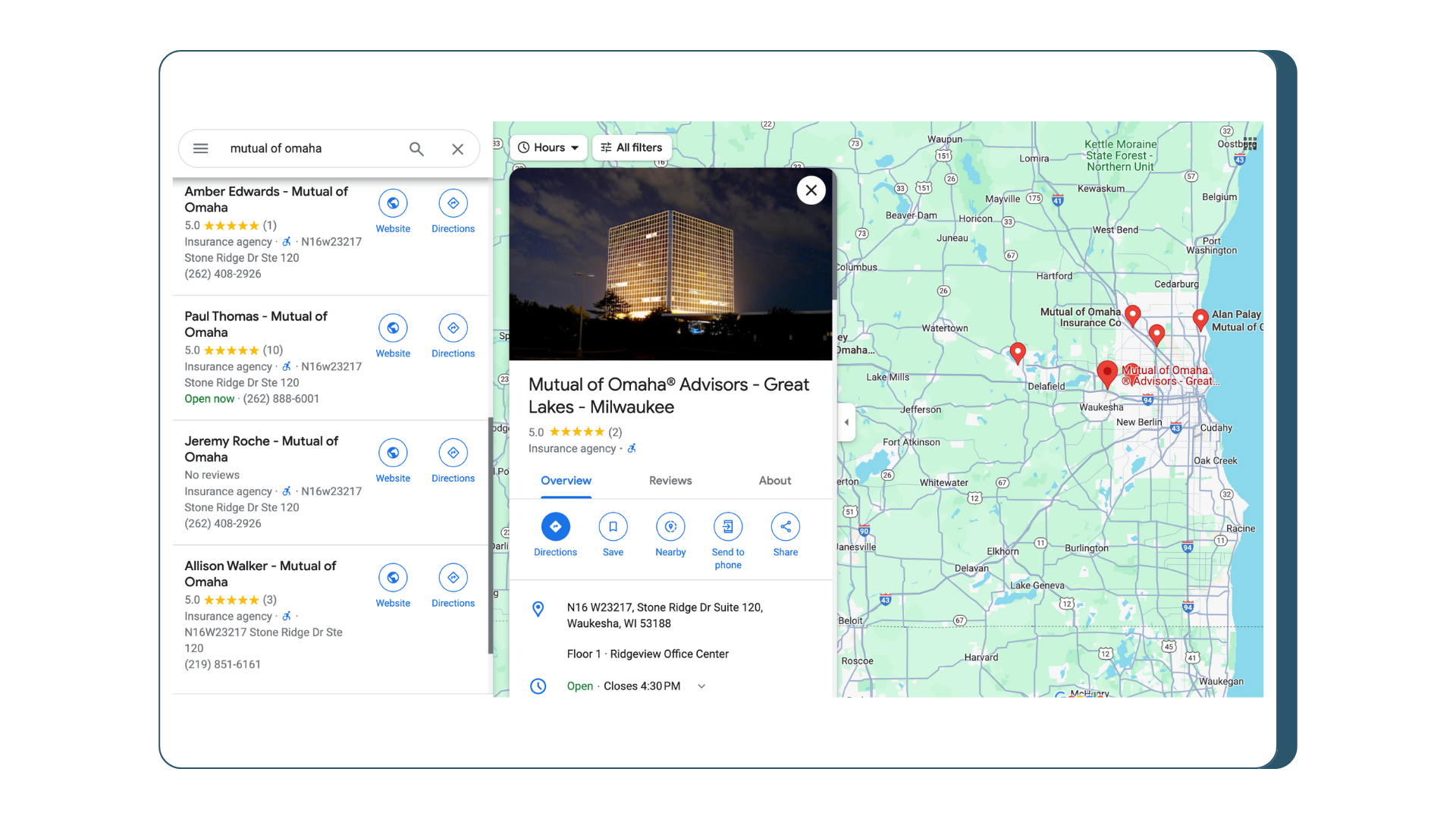
Your Google Business Profile (GBP) is the most important local listing since Google has 91% of the search engine market share. Because of this, we’ll focus on Google Search and Maps throughout this piece.
Google says, “Businesses with complete and accurate information are easier to match with the right searches.”
Thus, your GBPs and other local listings must have accurate information. Inaccurate information can confuse search engines, resulting in lower rankings. Even worse, clients who see incorrect information will often become frustrated and likely visit a competitor instead.
Our Consumer Behavior Index (CBI) research found that only 15% of consumers frequently encounter inaccurate business information; however, when visiting a store that says it’s open and is closed, 47% would look for a similar business nearby.
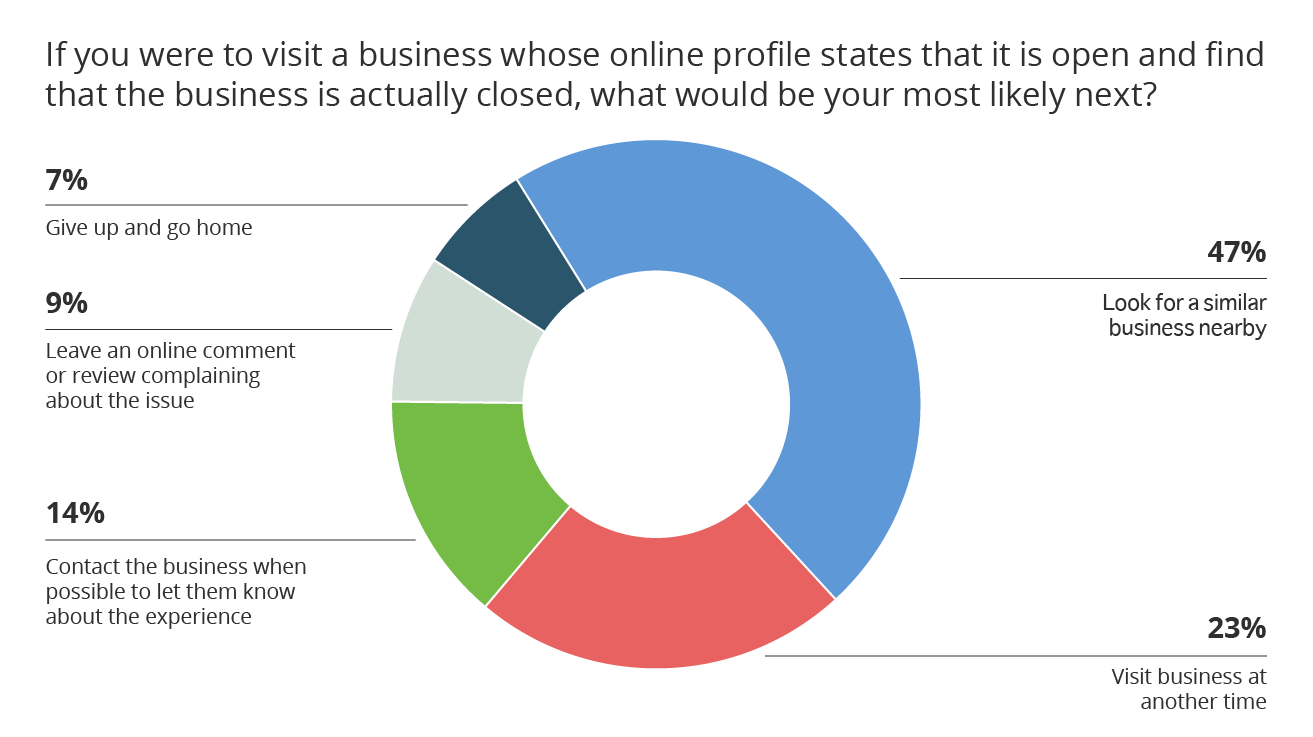
Read our detailed article on local listings for more information on claiming and fully optimizing your GBPs and other local listings!
2. Select the Right GBP Category
If you’re unaware, a category is a label you can select on your GBP to signal to Google and users what your business does. For instance, if you’re an insurance agency, you should likely select the “insurance agency” category to help ensure you appear for search queries like “insurance agents” or “insurance company near me.”
There are over 4,100 category options, with new ones added regularly. Categories help Google determine which businesses to show in search results.
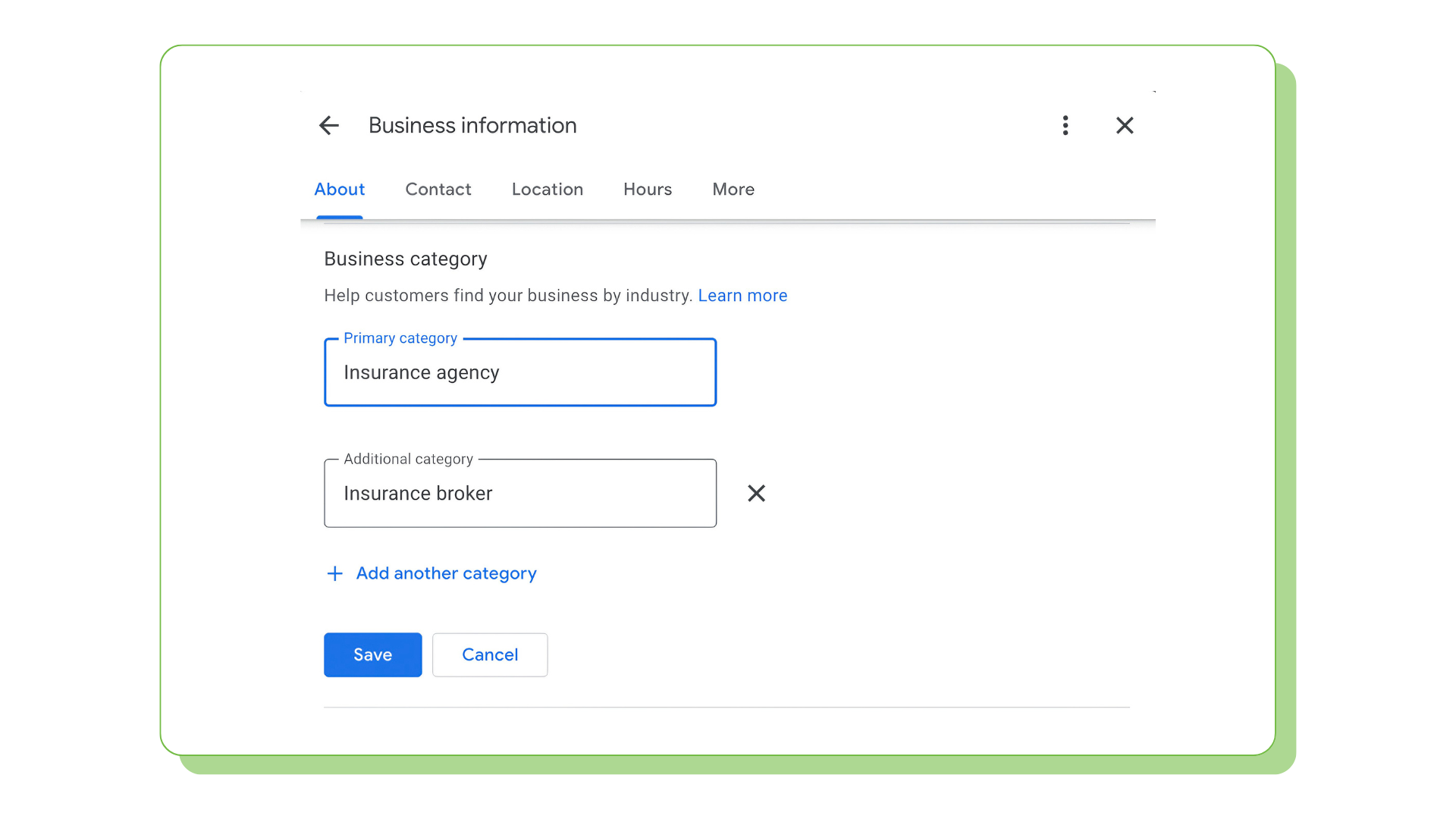
According to the Local Search Ranking Factors survey, an accurate primary GBP category is the top local pack/finder ranking factor.
As you can see, you must select the right category to signal to Google and users what your business is all about.
You can select more than one category. However, the primary category should be most closely related to what your business does, and additional categories can highlight additional products and services your business offers.
When picking categories, we recommend considering the following:
- The category that best fits your services and offerings
- The categories that top-ranking local competitors have selected
- Keywords that consumers might use when searching for your business
3. Enhance Your Online Visibility with Ratings and Reviews
Ratings and reviews are essential for local listings and improving online visibility. Let’s clarify the distinction between the two:
- Ratings are numerical scores within a set range. On Google and Yelp, they range from 1 to 5 stars.
- Reviews are often a star rating with a text comment
According to the 2023 local search ranking factors, “high numerical Google ratings (e.g., 4-5 stars)” is the sixth most crucial local pack/finder ranking factor, and “quantity of native Google reviews (w/ text)” is the eighth highest factor.
In addition to the information included on local listings, search engines and directories also judge local listings’ by their:
- Star rating/quality of reviews
- Review volume
- Velocity (how often your business receives reviews)
At the time of our writing this article, our dynamic 2023 Local Visibility Index (LVI) revealed that financial services companies’ local listings average:
- 60.3 reviews on Google
- 5.8 reviews on Yelp
- 4.7 recommendations on Facebook
Your financial services company can increase review volume by making it easy for clients to leave reviews and by responding to them, which demonstrates customer care to current and prospective clients.
Request an LVI audit to see how your financial firm stacks up against the competition for reviews and other localized marketing KPIs.
4. Create and Optimize Local Pages
Local pages, sometimes called local landing pages, are individual landing pages that live on your website and connect to one specific location, franchise, or agent.
Local pages are similar to local listings as they detail your store’s business information. However, they differ because you have complete control over them, allowing you to customize information, as seen in the example below:
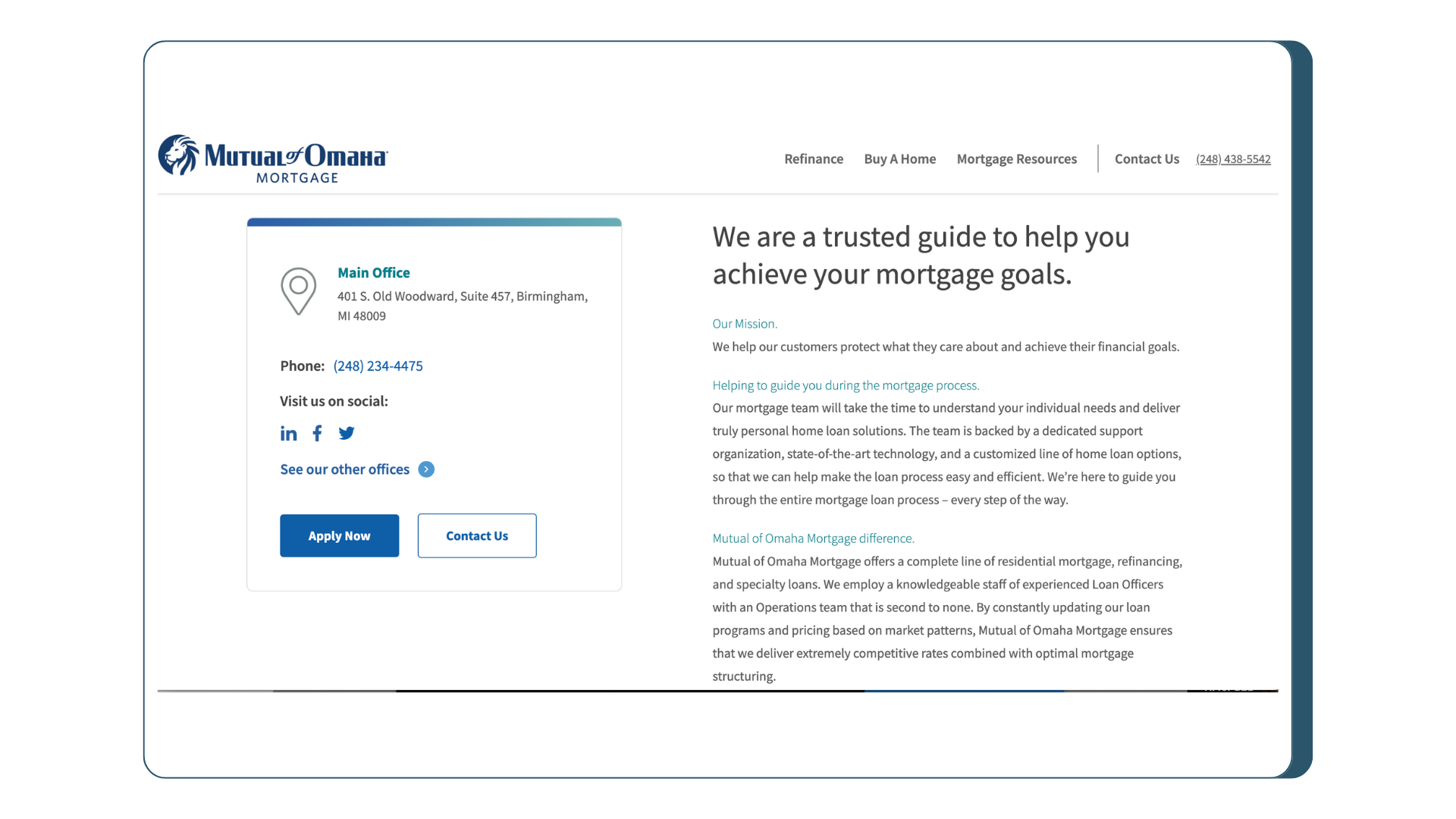
At a minimum, your local pages should have the following:
- Name, address, and phone number (NAP) information
- Business and service-specific operating hours
- Example: Your bank branch and ATM have different hours
- Services your local firm or agent offers
- Calls-to-actions (CTAs) such as “talk to a representative” or current sales and promotions
- An embedded map and driving directions
- Ratings and reviews
- High-quality photos and videos
- Links to your local listings and social media profiles
Read our article on local landing pages for more details on optimizing these essential pages!
5. Enhance Your Listings with High-Quality Photos
Incorporating high-quality images in your local listings is a surefire way to attract attention and boost your local search rankings.
We know that Google indexes photo content. Although photos and videos don’t directly influence rankings, they improve user engagement, which can indirectly influence rankings via increased click-through rates (CTRs). Additionally, a better user experience (UX) often translates to more positive reviews.
We recommend including interior and exterior photos of your business and changing them quarterly to show Google you’re actively updating your GBP.
6. Build a Strong Internal Linking Strategy
A robust internal linking strategy is critical for improving your local SEO. This strategy involves creating multiple pathways within your website to lead visitors through their customer journey seamlessly.
A robust internal linking strategy is pivotal to maintaining a strong online presence. Internal linking is the second most significant local organic ranking factor. Below are three necessary internal linking strategies:
Link between local and other website pages:
The first internal linking strategy involves adding links from your blog posts or articles to your local pages. Similarly, your local pages should also feature links to other sections of your site, including your services and FAQ pages, or links to helpful tools such as a client portal and an online calculator.
These internal links highlight page authority.
Use relevant anchor text:
Another SEO best practice is to utilize relevancy in your anchor text. If you’re unfamiliar with the term, anchor text is the clickable text in a hyperlink, guiding users and search engines to understand the subject matter of the linked content.
This means that keywords or phrases should relate to the page you’re linking to. For example, when linking to a blog post associated with a specific keyword, consider using that keyword or a similar phrase in the anchor text.
Link to social media profiles:
In July 2023, Google allowed businesses to add social media links to their GBPs. In March 2024, Google updated its API to automatically add social media links to some GBPs.
These updates emphasize the value Google places on social media links. These social media links on GBPs give consumers more information about your business and signal to Google that you’re actively engaging with clients. Learn how to add social media links to your GBP!
Now that you’ve grasped these essential tactics, download our comprehensive guide, The Top 10 Things Financial Services Companies Should Be Doing in Local SEO, to master your financial firm’s local SEO strategy.
The Genius Solution to Your Local SEO Woes
As you can see, managing your firm’s local SEO strategies is a larger undertaking.
There are hundreds of ranking factors, online engagements, and search engine algorithm updates to keep up with. That’s where Genius Search comes into play.
Genius Search is an AI-powered automation layer on top of our local listings management tool. It uses best-in-class generative AI to pull real-time data, such as reviews, engagements, keywords, and queries. It then analyzes this data and generates monthly location-specific recommendations.
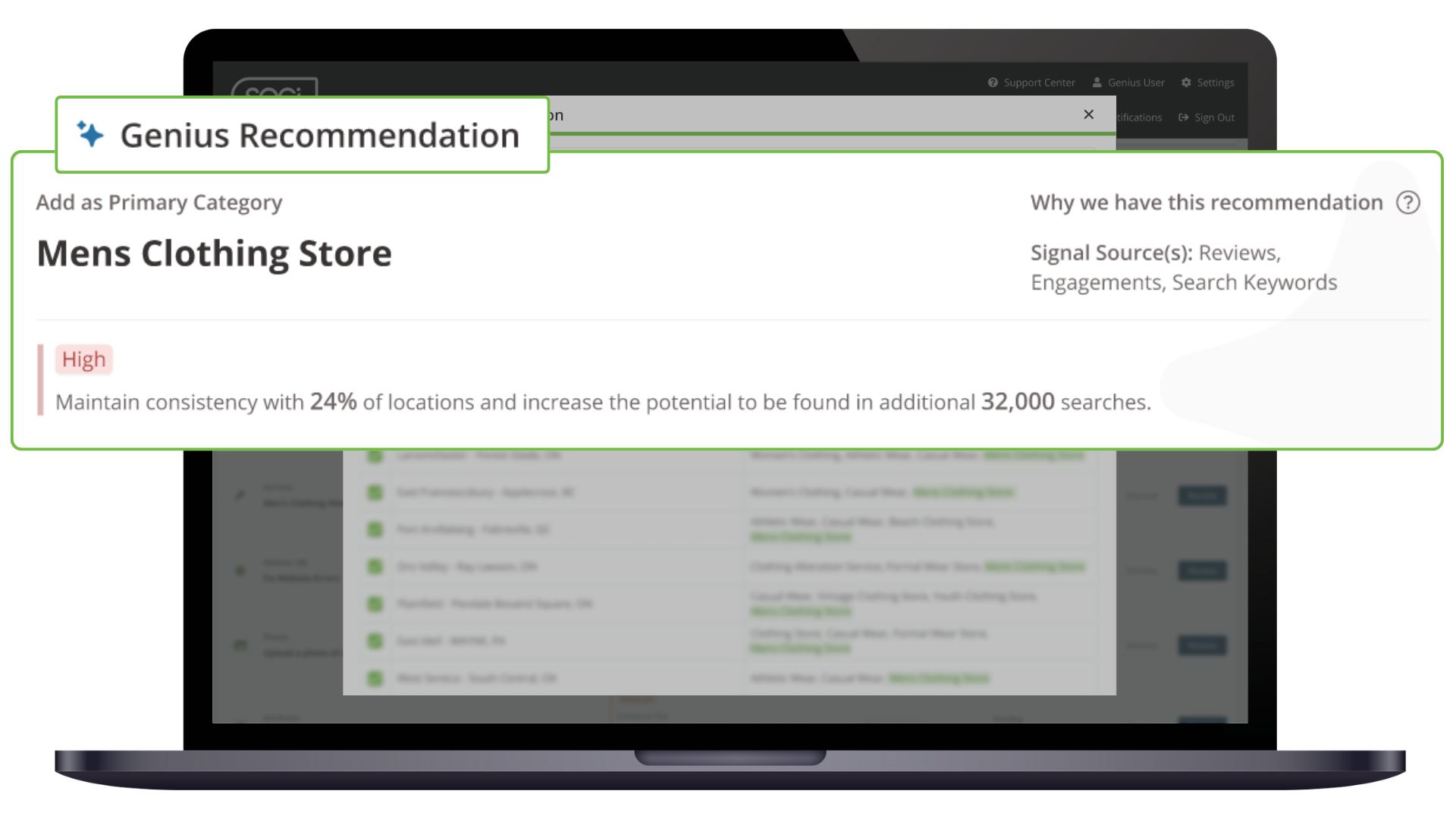
Genius Search redefines search optimization by utilizing AI and SEO best practices. With Genius Search, you’ll gain more foot traffic and increase consumer trust, loyalty, and revenue growth.
Furthermore, we’ve just released SOCi Shield. SOCi Shield serves as a digital safeguard for each local firm and agent. It has predefined and custom policies to automatically check and notify you of any external communication policy violations. It also integrates with top archiving tools, preserving records for regulatory needs.
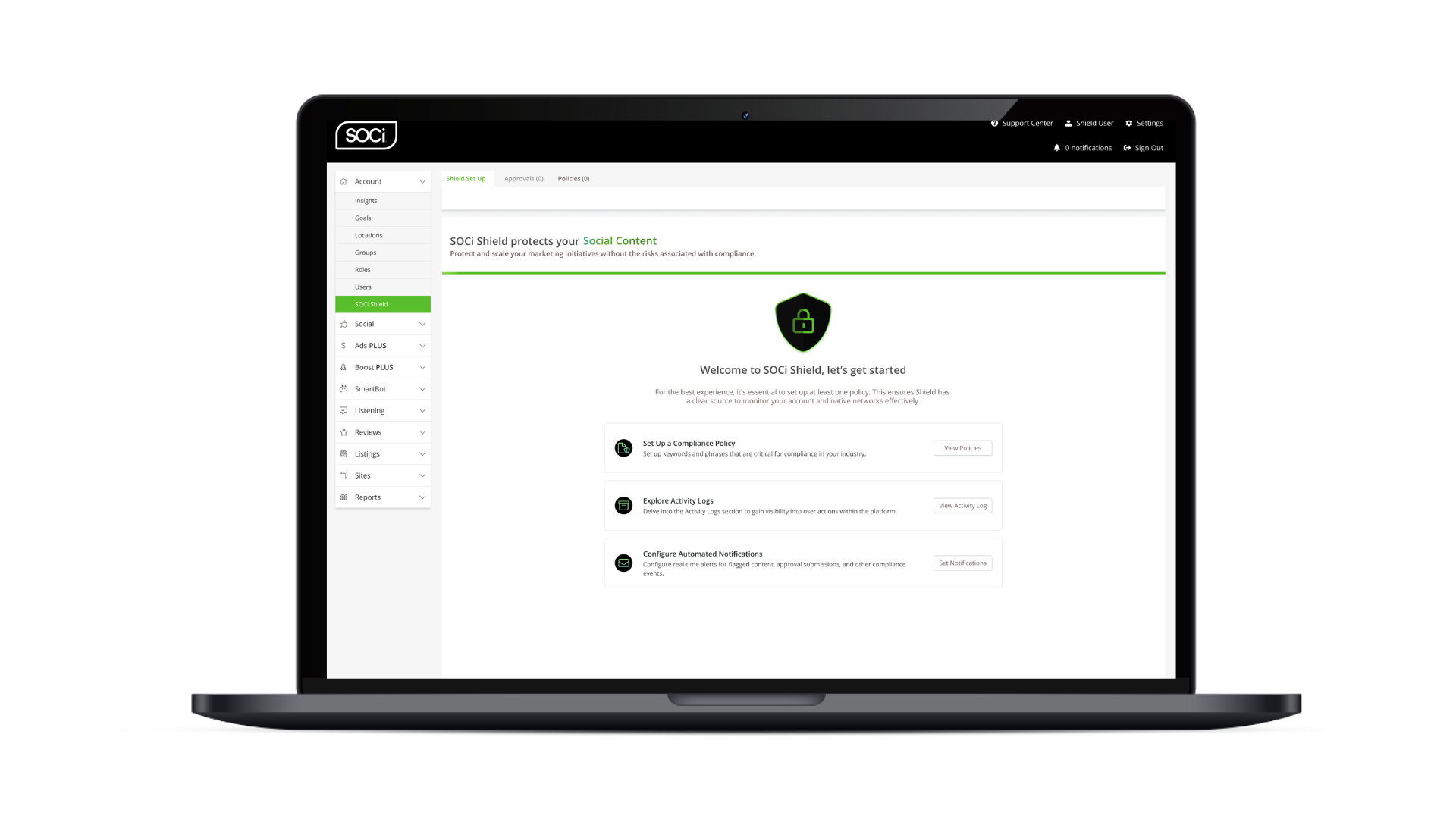
Financial services companies need Genius Search to elevate their local SEO strategy and boost revenue growth. Request a demo today to transform your local SEO strategy.






